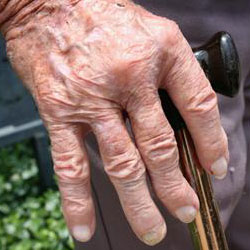New NICE guidelines say rheumatoid arthritis patients should seek out ‘specialist care’ if their disease worsens of flares up.
The new recommendations, published earlier this week, also says every patient diagnosed with rheumatoid arthritis should receive anti-CCP antibody testing, to determine the severity of their condition.
This can be carried out in primary care to aid diagnosis, or in secondary care after diagnosis.
The new guideline says: ‘If anti-CCP antibodies are present or there are erosions on X-ray… emphasise the importance of monitoring their condition and seeking rapid access to specialist care if disease worsens or they have a flare.’
Other recommendations include:
- Consider measuring anti-CCP antibodies in adults with suspected RA if they are negative for rheumatoid factor
- Measure functional ability using, for example, the Health Assessment Questionnaire, to provide a baseline for assessing the functional response to treatment
- Advise the person that they have an increased risk of radiological progression but not necessarily an increased risk of poor function, if anti-CCP antibodies are present or there are erosions on X-ray
A NICE spokesperson said: ‘The guideline now strengthens the previous recommendation around anti-CCP antibody testing for some people with suspected RA by recommending that everyone with a diagnosis of RA is now given the test.
‘This is because evidence shows that people who test positive for anti-CCP antibodies – and who have damage to their joints which shows up on an X-ray – have a higher risk of developing more severe RA and need to be advised of the importance of monitoring their condition.’
But BMA GP Committee clinical and prescribing policy lead Dr Andrew Green said: ‘The most important thing for GPs to realise is that a negative anti-CCP test does not rule out significant disease and the referral should be made on clinical grounds. We know that early intervention makes a real difference to patients’ long-term outcomes and urgent appointments must be readily available.
‘Many GPs find rheumatoid factor an expensive and unhelpful test and not useful for assessing the need for specialist opinion. One-stop MSK centres organised with good GP support may have a role to play in ensuring timely access.’
GPs have previously been told to discuss the impact of being overweight on treatment outcomes with rheumatoid arthritis patients, after a new study found that those with healthy BMIs are more likely to achieve sustained disease remission than those who are overweight.
Recommendations in full
Referral from primary care
1.1.1 Refer for specialist opinion any adult with suspected persistent synovitis of undetermined cause. Refer urgently (even with a normal acute-phase response, negative anti-cyclic citrullinated peptide [CCP] antibodies or rheumatoid factor) if any of the following apply:
- the small joints of the hands or feet are affected
- more than one joint is affected
- there has been a delay of 3 months or longer between onset of symptoms and seeking medical advice. [2009, amended 2018]
Investigations
If the following investigations are ordered in primary care, they should not delay referral for specialist opinion.
Investigations for diagnosis
1.1.3 Consider measuring anti-CCP antibodies in adults with suspected RA if they are negative for rheumatoid factor. [2009, amended 2018]
1.1.4 X-ray the hands and feet in adults with suspected RA and persistent synovitis. [2009, amended 2018]
Investigations following diagnosis
1.1.5 As soon as possible after establishing a diagnosis of RA:
- measure anti-CCP antibodies, unless already measured to inform diagnosis
- X-ray the hands and feet to establish whether erosions are present, unless X-rays were performed to inform diagnosis
- measure functional ability using, for example, the Health Assessment Questionnaire (HAQ), to provide a baseline for assessing the functional response to treatment. [2018]
1.1.6 If anti-CCP antibodies are present or there are erosions on X-ray:
- advise the person that they have an increased risk of radiological progression but not necessarily an increased risk of poor function, and
- emphasise the importance of monitoring their condition, and seeking rapid access to specialist care if disease worsens or they have a flare. [2018]
Source: NICE
Visit Pulse Reference for details on 140 symptoms, including easily searchable symptoms and categories, offering you a free platform to check symptoms and receive potential diagnoses during consultations.

















